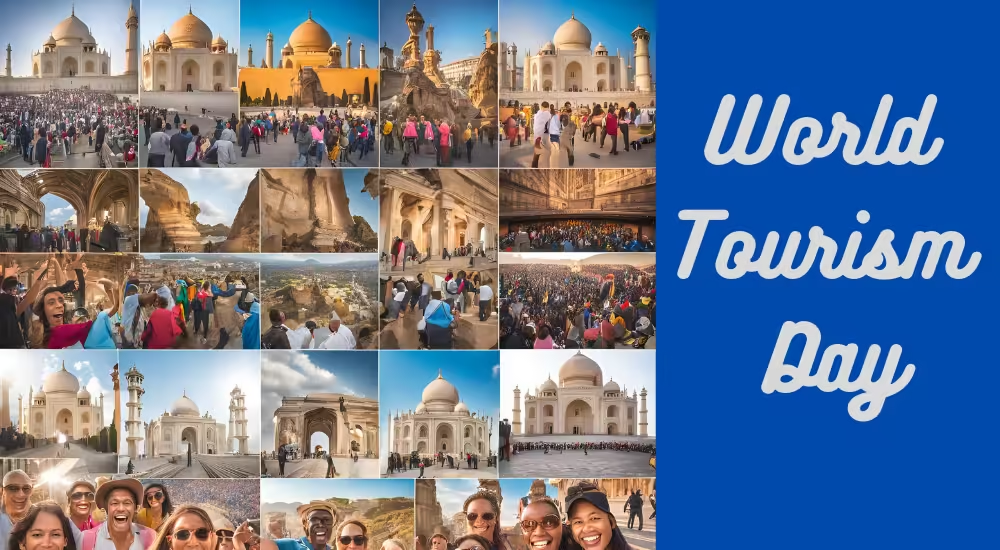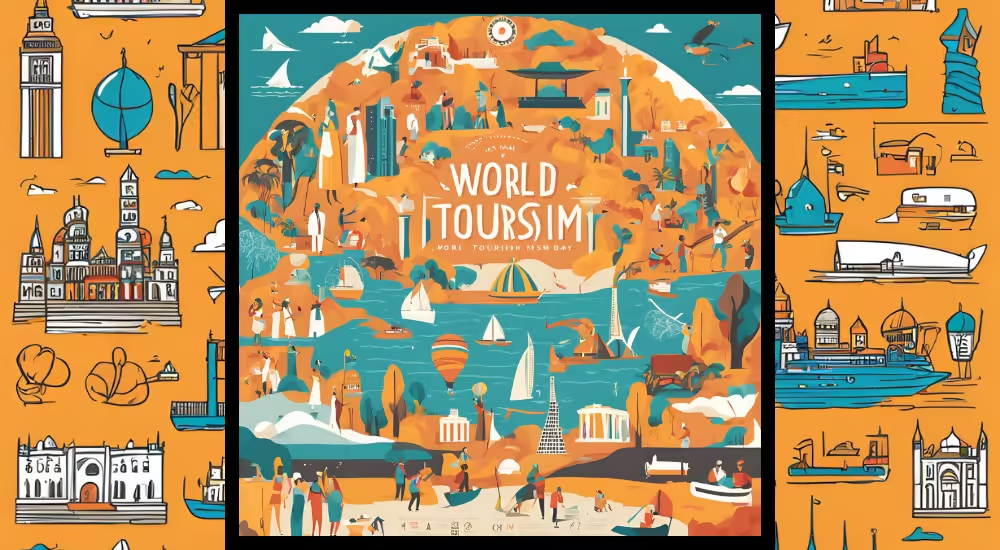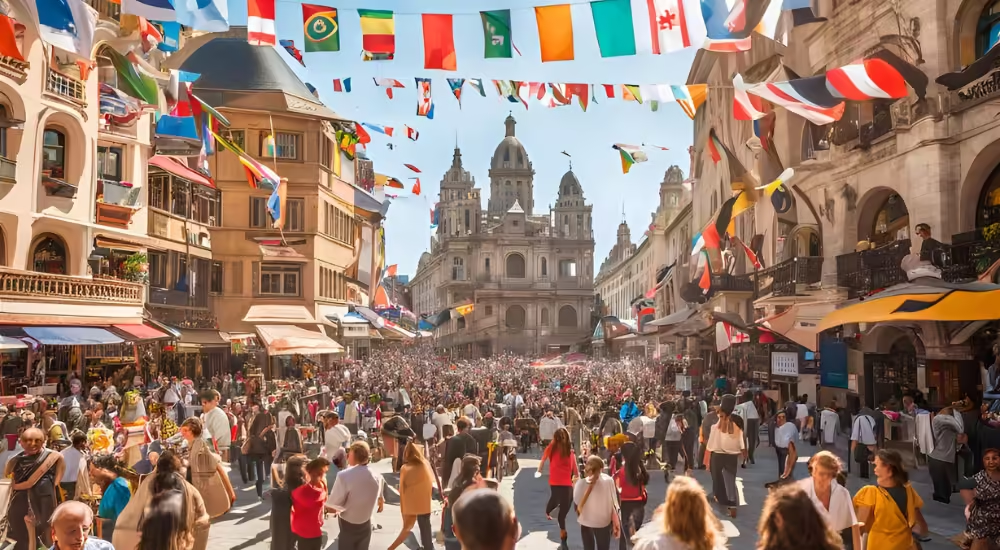 World Tourism Day: A Global Celebration of Travel and Cultural Exchange
World Tourism Day: A Global Celebration of Travel and Cultural Exchange
World Tourism Day, celebrated annually on September 27th, is an important international observance aimed at raising awareness about the vital role of tourism in fostering cultural exchange, economic growth, and sustainable development. Initiated by the United Nations World Tourism Organization (UNWTO) in 1980, this day highlights the far-reaching social, cultural, political, and economic impacts of tourism, underscoring its role in promoting peace, bridging cultures, and fostering global cooperation.
Tourism is one of the most significant and dynamic sectors in the global economy, directly contributing to the growth and prosperity of many nations. As a result, the themes chosen each year for World Tourism Day reflect emerging trends, challenges, and opportunities within the tourism sector, with a particular focus on sustainability, inclusivity, and the use of technology to promote travel for everyone. This article explores the history, significance, themes, and future outlook of World Tourism Day, delving into its global importance and the impact of tourism on the world.
History of World Tourism Day
The UNWTO initiated World Tourism Day in 1980, selecting September 27 as the annual date due to its symbolic importance. This day marks the anniversary of the adoption of the UNWTO Statutes in 1970, a milestone that laid the foundation for the establishment of the World Tourism Organization. The celebration of World Tourism Day was created to highlight the tourism sector’s potential in promoting development, cultural preservation, and mutual understanding between nations.
The decision to designate a special day for tourism followed the recognition of the increasing importance of travel and tourism, especially as an avenue for economic development and cultural exchange. It is an opportunity for stakeholders across the tourism industry—governments, businesses, travel agencies, local communities, and tourists—to come together and reflect on the achievements and challenges of tourism.
Each year, the UNWTO designates a different country as the official host for World Tourism Day, often focusing on a particular theme relevant to the industry’s evolving trends. Hosting the event enables countries to showcase their tourism potential while emphasizing sustainable practices and inclusivity in travel. The celebrations typically involve conferences, exhibitions, cultural events, and discussions on tourism policies and practices.
Importance of Tourism in the Global Economy- Tourism day
Tourism is a cornerstone of many national economies and a major driver of global development. According to the World Travel & Tourism Council (WTTC), tourism accounted for approximately 10% of the global GDP and created millions of jobs worldwide before the COVID-19 pandemic significantly disrupted the industry. While the pandemic caused unprecedented challenges, tourism has steadily shown resilience, demonstrating its capacity for recovery and growth.
Tourism provides direct and indirect employment opportunities across a wide range of sectors, including hospitality, transport, food services, retail, and entertainment. The sector fosters entrepreneurship and promotes local businesses, offering opportunities for people in both urban and rural areas to benefit from tourism-related activities.
Moreover, tourism contributes to infrastructure development, such as roads, airports, and communication networks, which benefit both locals and tourists. The revenues generated by tourism often go towards improving local living conditions, healthcare, and educational facilities, ultimately enhancing the quality of life in host communities.
Tourism is not only an economic driver but also a vehicle for cultural exchange. Travelers can immerse themselves in different cultures, languages, traditions, and ways of life, fostering greater understanding and respect among people of different backgrounds. This exchange contributes to the preservation of cultural heritage and promotes peace and mutual understanding on a global scale.
Themes of World Tourism Day Over the Years
Each year, World Tourism Day is celebrated with a unique theme that reflects current global priorities or challenges within the tourism industry. These themes are designed to encourage dialogue on how tourism can contribute to the Sustainable Development Goals (SDGs) set by the United Nationsb on World Tourism Day.
1. Tourism and Sustainable Development (1987 World Tourism Day)
One of the earliest themes, “Tourism and Sustainable Development,” highlighted the need to balance tourism growth with the preservation of the environment and cultural heritage. Sustainable tourism seeks to minimize negative impacts on the environment and local cultures while maximizing the benefits for host communities.
2. Tourism and the Digital Transformation (2018- World Tourism Day)
In 2018, the theme “Tourism and the Digital Transformation” emphasized the growing role of technology in reshaping the travel experience. The rapid advancement of digital technologies, including artificial intelligence, big data, and mobile applications, has transformed how people plan, book, and experience travel. The focus was on leveraging technology to make travel more accessible, efficient, and personalized for all.
3. Tourism and Jobs: A Better Future for All (2019- World Tourism Day)
The theme in 2019, “Tourism and Jobs: A Better Future for All,” highlighted tourism’s crucial role in job creation. The industry is a major employer, providing millions of jobs worldwide, especially for women and young people. This theme underscored the need for governments and stakeholders to support job creation and skills development in the tourism sector.
4. Tourism and Rural Development (2020- World Tourism Day)
The 2020 theme, “Tourism and Rural Development,” highlighted the role of tourism in supporting rural communities, especially in the wake of the COVID-19 pandemic. Rural areas are often rich in cultural heritage and natural beauty, but they may lack the infrastructure to fully benefit from tourism. This theme called for a focus on developing sustainable tourism practices that could revitalize rural economies, create jobs, and preserve traditional ways of life.
5. Rethinking Tourism (2022- World Tourism Day)
The COVID-19 pandemic significantly impacted global tourism, leading to travel restrictions, economic losses, and job cuts. In response, the theme for 2022, “Rethinking Tourism,” focused on rebuilding the tourism sector in a more resilient, sustainable, and inclusive way. This theme encouraged stakeholders to consider how tourism could recover from the pandemic’s effects and play a central role in the global recovery process.
World Tourism Day 2023: Embracing Sustainability
The theme for World Tourism Day 2023, “Tourism and Green Investments,” underscores the importance of fostering sustainable tourism by encouraging eco-friendly investments in the sector. The idea is to promote a tourism industry that prioritizes environmental preservation and community well-being while still generating economic growth. As global concerns about climate change continue to mount, the tourism industry is increasingly recognizing the need to shift towards greener practices to minimize its environmental footprint.
Sustainable tourism emphasizes responsible travel that minimizes negative impacts on the environment and local cultures. This means reducing carbon emissions, conserving biodiversity, and supporting local economies. Eco-tourism, which focuses on nature-based experiences, has emerged as one of the fastest-growing segments of the tourism industry. By promoting green investments, the theme for 2023 encourages countries and businesses to adopt environmentally friendly policies, practices, and infrastructure.
The Impact of COVID-19 on Global Tourism
The COVID-19 pandemic, which began in 2020, brought the global tourism industry to a standstill, with widespread travel restrictions, lockdowns, and quarantine measures implemented worldwide. International tourist arrivals plummeted by nearly 74% in 2020 compared to previous years, leading to severe economic losses, business closures, and job cuts across the tourism sector. Many countries, especially those heavily dependent on tourism, faced significant challenges in managing the pandemic’s socio-economic consequences.
The pandemic forced the tourism industry to rethink its future, highlighting the importance of resilience and sustainability. Governments and businesses have since been exploring innovative ways to ensure safe travel, such as introducing health protocols, digital health passes, and contactless travel experiences. As the world gradually recovers from the pandemic, the tourism industry is expected to rebound stronger, with a renewed focus on sustainability, technology, and inclusivity.
The Role of Technology in Tourism
Technology has revolutionized the tourism industry in recent years, enhancing the way travelers plan, book, and experience trips. The digital transformation of the tourism sector has opened up new possibilities for both travelers and businesses, making travel more accessible, convenient, and personalized. From online booking platforms and virtual tours to mobile apps and artificial intelligence, technology plays a crucial role in improving the efficiency and effectiveness of tourism operations.
Digital platforms such as Airbnb, Booking.com, and TripAdvisor have transformed the way people search for accommodations, transportation, and attractions. These platforms provide travelers with access to a wide range of options, along with reviews and ratings from other travelers, enabling them to make informed decisions. Additionally, virtual reality (VR) and augmented reality (AR) technologies allow travelers to experience destinations remotely, offering a preview of potential travel experiences.
Artificial intelligence (AI) is another key technological innovation that has transformed tourism, particularly through chatbots and personalized recommendations. AI-driven chatbots are now widely used by airlines, hotels, and travel agencies to provide instant customer support, while AI algorithms analyze user data to offer tailored travel recommendations based on individual preferences and interests.
Challenges Facing the Tourism Industry
Despite its immense contributions to global development, tourism faces a range of challenges that require careful attention and action. Some of the most pressing challenges include:
- Overtourism Popular destinations like Venice, Barcelona, and Bali have faced the problem of overtourism, where excessive numbers of tourists overwhelm local infrastructure, cause environmental degradation, and disrupt local communities. This can lead to negative impacts on residents’ quality of life and the natural environment, prompting destinations to implement regulations and caps on visitor numbers.
- Climate Change Tourism is a significant contributor to greenhouse gas emissions, particularly through air travel. As concerns about climate change grow, the tourism industry must address its environmental impact by adopting more sustainable practices, promoting eco-friendly modes of transportation, and encouraging travelers to choose greener options.
- Cultural Preservation The influx of tourists to culturally significant sites can lead to the erosion of local traditions and practices. It is essential for tourism to be managed in a way that respects and preserves cultural heritage, ensuring that tourism benefits local communities without compromising their cultural identity.
- Economic Inequality While tourism can bring economic benefits to many regions, it can also exacerbate economic inequality if the profits are not distributed fairly. Ensuring that tourism revenue reaches local communities and supports sustainable development is crucial for reducing inequality and promoting inclusive growth.
The Future of Tourism: A Path Towards Sustainability
As the world looks ahead to the future of tourism, sustainability will play an increasingly critical role. Sustainable tourism practices are essential for preserving the natural and cultural resources that attract tourists in the first place. By adopting responsible travel practices and supporting eco-friendly tourism initiatives, travelers and businesses can contribute to the long-term viability of the tourism industry.
Some of the key trends shaping the future of tourism include:
- Eco-tourism and Green Travel With growing awareness of environmental issues, eco-tourism has gained popularity among travelers who seek to minimize their impact on the planet. Green travel initiatives, such as carbon offset programs and sustainable accommodations, allow tourists to enjoy nature while supporting conservation efforts.
- Cultural Immersion and Experiential Travel Rather than simply visiting tourist attractions, many travelers are now seeking more meaningful experiences that allow them to immerse themselves in local cultures. Experiential travel, which focuses on authentic interactions with local communities, promotes cultural understanding and helps to preserve traditional practices.
- Technology-Driven Personalization As technology continues to evolve, travelers will benefit from increasingly personalized travel experiences. AI-driven platforms and apps will offer tailored recommendations based on individual preferences, allowing travelers to create unique itineraries that suit their interests and needs.
- Health and Safety Protocols The COVID-19 pandemic has heightened travelers’ awareness of health and safety concerns. As a result, the tourism industry is likely to continue implementing rigorous health and safety protocols to ensure that travel remains safe and secure in the post-pandemic world.
Conclusion
World Tourism Day serves as a reminder of the profound impact that tourism has on the global economy, cultural exchange, and sustainable development. By celebrating the World Tourism Day, the world acknowledges the importance of tourism in fostering mutual understanding, promoting economic growth, and preserving the environment for future generations.
As the tourism industry continues to recover from the challenges posed by the COVID-19 pandemic, it is essential to embrace sustainable practices that prioritize the well-being of both travelers and host communities. By focusing on eco-friendly tourism, technological innovation, and cultural preservation, the future of tourism promises to be more inclusive, resilient, and sustainable for all.
Stay tuned for more news…